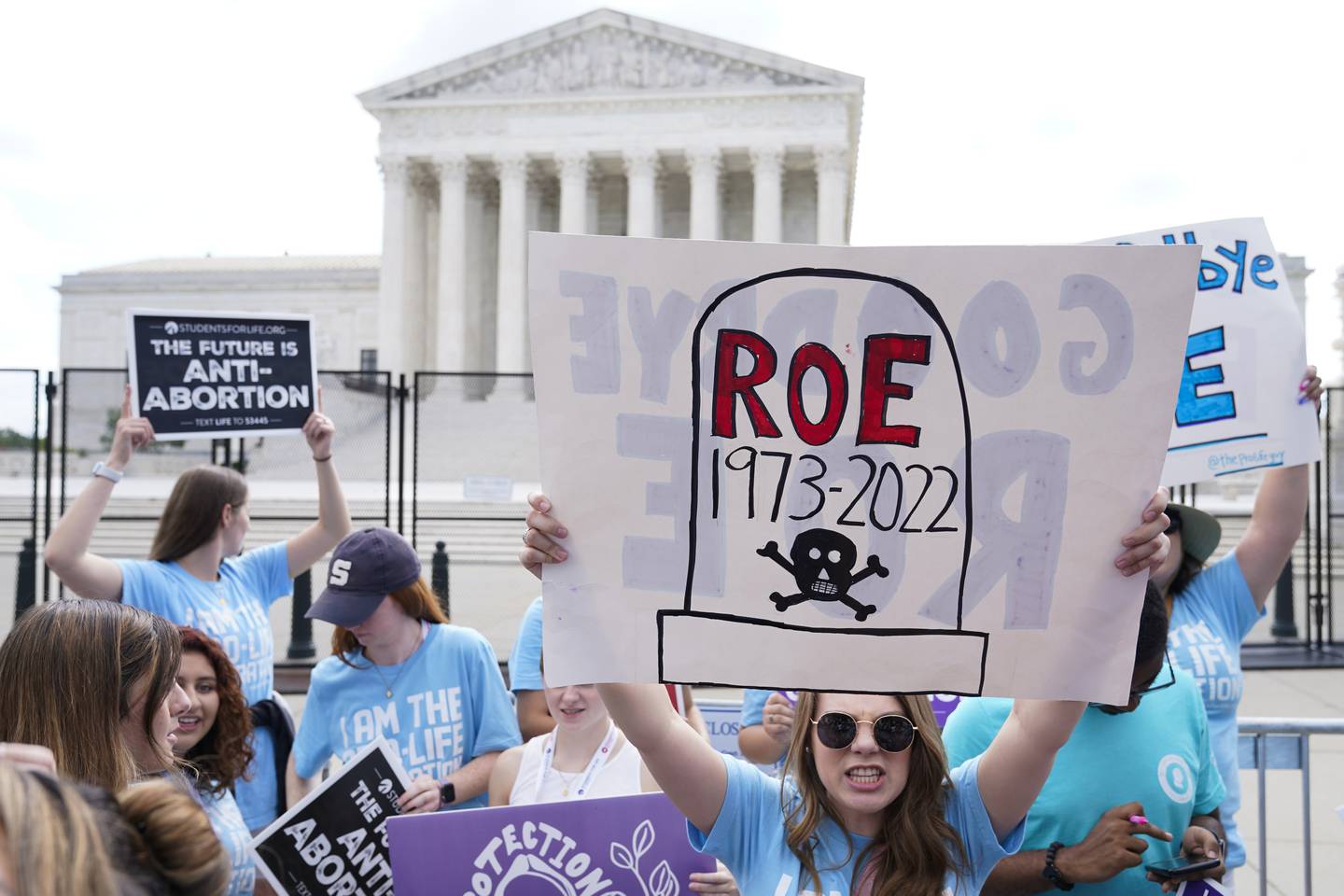WASHINGTON — The Supreme Court has ended constitutional protections for abortion that had been in place nearly 50 years in a decision by its conservative majority to overturn Roe v. Wade. Friday’s outcome is expected to lead to abortion bans in roughly half the states.
The decision, unthinkable just a few years ago, was the culmination of decades of efforts by abortion opponents, made possible by an emboldened right side of the court that has been fortified by three appointees of former President Donald Trump.
Advertisement
The ruling came more than a month after the stunning leak of a draft opinion by Justice Samuel Alito indicating the court was prepared to take this momentous step.
It puts the court at odds with a majority of Americans who favored preserving Roe, according to opinion polls.
Advertisement
Alito, in the final opinion issued Friday, wrote that Roe and Planned Parenthood v. Casey, the 1992 decision that reaffirmed the right to abortion, were wrong the day they were decided and must be overturned.
“We therefore hold that the Constitution does not confer a right to abortion. Roe and Casey must be overruled, and the authority to regulate abortion must be returned to the people and their elected representatives,” Alito wrote.
Authority to regulate abortion rests with the political branches, not the courts, Alito wrote.
Joining Alito were Justices Clarence Thomas, Neil Gorsuch, Brett Kavanaugh and Amy Coney Barrett. The latter three justices are Trump appointees. Thomas first voted to overrule Roe 30 years ago.
Chief Justice John Roberts would have stopped short of ending the abortion right, noting that he would have upheld the Mississippi law at the heart of the case, a ban on abortion after 15 weeks, and said no more.
Justices Stephen Breyer, Sonia Sotomayor and Elena Kagan — the diminished liberal wing of the court — were in dissent.
“With sorrow—for this Court, but more, for the many millions of American women who have today lost a fundamental constitutional protection—we dissent,” they wrote.
The ruling is expected to disproportionately affect minority women who already face limited access to health care, according to statistics analyzed by The Associated Press.
Advertisement
Mississippi’s only abortion clinic, which is at the center of the case, continued to see patients Friday. Outside, men used a bullhorn to tell people inside the clinic that they would burn in hell. Clinic escorts wearing colorful vests used large stereo speakers to blast Tom Petty’s “I Won’t Back Down” at the protesters.
Mississippi is one 13 states, mainly in the South and Midwest, that already have laws on the books that ban abortion in the event Roe is overturned. Another half-dozen states have near-total bans or prohibitions after 6 weeks of pregnancy, before many women know they are pregnant.
In roughly a half-dozen other states, the fight will be over dormant abortion bans that were enacted before Roe was decided in 1973 or new proposals to sharply limit when abortions can be performed, according to the Guttmacher Institute, a research group that supports abortion rights.
More than 90% of abortions take place in the first 13 weeks of pregnancy, and more than half are now done with pills, not surgery, according to data compiled by Guttmacher.

The decision came against a backdrop of public opinion surveys that find a majority of Americans oppose overturning Roe and handing the question of whether to permit abortion entirely to the states. Polls conducted by The Associated Press-NORC Center for Public Affairs Research and others also have consistently shown about 1 in 10 Americans want abortion to be illegal in all cases. A majority are in favor of abortion being legal in all or most circumstances, but polls indicate many also support restrictions especially later in pregnancy.
The Biden administration and other defenders of abortion rights have warned that a decision overturning Roe also would threaten other high court decisions in favor of gay rights and even potentially, contraception.
Advertisement
The liberal justices made the same point in their joint dissent: The majority “eliminates a 50-year-old constitutional right that safeguards women’s freedom and equal station. It breaches a core rule-of-law principle, designed to promote constancy in the law. In doing all of that, it places in jeopardy other rights, from contraception to same-sex intimacy and marriage. And finally, it undermines the Court’s legitimacy.”
But Alito contended that his analysis addresses abortion only. “Nothing in this opinion should be understood to cast doubt on precedents that do not concern abortion,” he wrote.
Whatever the intentions of the person who leaked Alito’s draft opinion, the conservatives held firm in overturning Roe and Casey.
In his draft, Alito dismissed the arguments in favor of retaining the two decisions, including that multiple generations of American women have partly relied on the right to abortion to gain economic and political power.
Changing the composition of the court has been central to the anti-abortion side’s strategy. Mississippi and its allies made increasingly aggressive arguments as the case developed, and two high-court defenders of abortion rights retired or died. The state initially argued that its law could be upheld without overruling the court’s abortion precedents.
Then-Gov. Phil Bryant signed the 15-week measure into law in March 2018, when Justices Anthony Kennedy and Ruth Bader Ginsburg were still members of a five-justice majority that was mainly protective of abortion rights.
Advertisement
By early summer, Kennedy had retired and was replaced by Justice Brett Kavanaugh a few months later. The Mississippi law was blocked in lower federal courts.
But the state always was headed to the nation’s highest court. It did not even ask for a hearing before a three-judge panel of the 5th U.S. Circuit Court of Appeals, which ultimately held the law invalid in December 2019.
By early September 2020, the Supreme Court was ready to consider the state’s appeal.
The court scheduled the case for consideration at the justices’ private conference on Sept. 29. But in the intervening weeks, Ginsburg died and Barrett was quickly nominated and confirmed without a single Democratic vote.
The stage now was set, although it took the court another half year to agree to hear the case.
By the time Mississippi filed its main written argument with the court in the summer, the thrust of its argument had changed and it was now calling for the wholesale overruling of Roe and Casey.
Advertisement
The first sign that the court might be receptive to wiping away the constitutional right to abortion came in late summer, when the justices divided 5-4 in allowing Texas to enforce a ban on the procedure at roughly six weeks, before some women even know they are pregnant. That dispute turned on the unique structure of the law, including its enforcement by private citizens rather than by state officials, and how it can be challenged in court.
But Justice Sonia Sotomayor noted in a searing dissent for the three liberal justices that their conservative colleagues refused to block “a flagrantly unconstitutional law” that “flouts nearly 50 years of federal precedents.” Roberts was also among the dissenters.
Then in December, after hearing additional arguments over whether to block the Texas law known as S.B. 8, the court again declined to do so, also by a 5-4 vote. “The clear purpose and actual effect of S. B. 8 has been to nullify this Court’s rulings,” Roberts wrote, in a partial dissent.
In their Senate hearings, Trump’s three high-court picks carefully skirted questions about how they would vote in any cases, including about abortion.
But even as Democrats and abortion rights supporters predicted Kavanaugh and Gorsuch would vote to upend abortion rights if confirmed, the two left at least one Republican senator with a different impression. Sen. Susan Collins of Maine predicted Gorsuch and Kavanaugh wouldn’t support overturning the abortion cases, based on private conversations she had with them when they were nominees to the Supreme Court.
Barrett was perhaps the most vocal opponent of abortion in her time as a law professor, before becoming a federal judge in 2017. She was a member of anti-abortion groups at Notre Dame University, where she taught law, and she signed a newspaper ad opposing “abortion on demand” and defending “the right to life from fertilization to natural death.” She promised to set aside her personal views when judging cases.
Advertisement
Trump, meanwhile, had predicted as a candidate that whoever he named to the court would “automatically” vote to overrule Roe.







